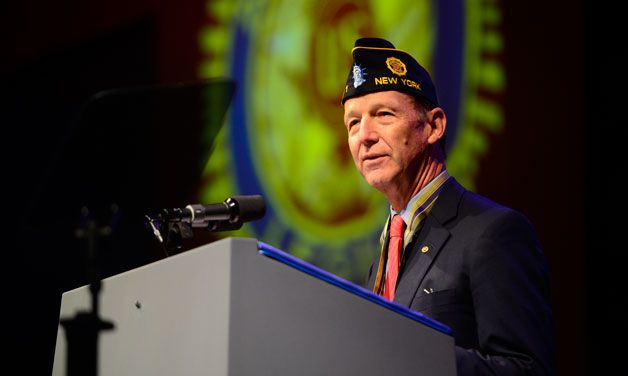Roosevelt shares Legion centennial vision
 Theodore Roosevelt IV, chairman of The American Legion’s 100th Anniversary Honorary Committee, told thousands of veterans and their families Tuesday that “everything… starts at the local post – individuals leading themselves and working hard to do what’s right for the country.”
Theodore Roosevelt IV, chairman of The American Legion’s 100th Anniversary Honorary Committee, told thousands of veterans and their families Tuesday that “everything… starts at the local post – individuals leading themselves and working hard to do what’s right for the country.”
That is why, he explained at the 95th American Legion National Convention in Houston, the organization’s centennial celebration will raise awareness of achievements and continuing service provided by nearly 14,000 local posts worldwide.
“As the 100th Anniversary Committee has looked back on the Legion’s history, a remarkable fact has come to light,” Roosevelt IV said on the opening day of the convention’s general session. “In the very first year of its existence, The American Legion chartered no fewer than 5,400 local posts nationwide and beyond, that are still operating today. I do not know where that ranks among the most successful franchises in American history, but I have to believe few can match it.”
A Vietnam War Navy veteran and New York Legionnaire, Roosevelt IV shared some of the history his grandfather, Theodore Roosevelt, Jr., helped set in motion in 1919 when the organization was founded in France. “The Legion’s founders believed that the key to success for this new veterans organization was equality,” he said. “You checked your rank at the door. If you took the oath of enlistment and served honorably during wartime, you were eligible for membership in The American Legion, regardless where you served, your gender or race.”
Roosevelt IV said the founding vision of a grassroots of veterans serving each other, young people and communities has not simply endured but has often had a profound impact on the course of the nation, including establishment of the Veterans Administration and passage of the Servicemen’s Readjustment Act of 1944, better known as the GI Bill of Rights.
Roosevelt IV showed the trailer of a documentary film now in production, “A Just Return,” that uses the GI Bill to illustrate The American Legion story over the last century. The film chronicles the difficult economic years that led World War I Legionnaires to push for, and win, passage of legislation that provided college educations, business opportunities, home ownership and economic prosperity for the nation after World War II and beyond. He said the Legion has continued to fight for stronger GI Bills over the decades, including the post-9/11 version that was passed in 2008 to better meet the needs of 21st-century veterans.
“The GI Bill is more than a legislative accomplishment,” Roosevelt IV said. “It’s a parable that illustrates The American Legion’s vision. It is a story that spans nearly a century, from the World War I Legionnaires who brought it into existence to the Iraq-Afghanistan generation using it today.”
Roosevelt IV said an honorary committee of distinguished Americans whose lives have been influenced by The American Legion is now being formed to help the organization celebrate its legacy and provide guidance for its future. He also explained that Legion collaborations now occurring with groups of post-9/11 veterans can help the organization define its second-century vision.
“Like those who came home before them, these post-9/11 veterans are turning to The American Legion,” Roosevelt IV said. “They are learning that the Legion can provide help and understanding like no one else.”
A new interactive website at www.legion.org/centennial debuted at the convention to offer local posts an online platform to share their legacies and visions for the future. Roosevelt IV encouraged Legionnaires to use the site to “help build a legacy future generations will celebrate in 2118 and 2119.”
From National American Legion http://www.legion.org/convention/217019/roosevelt-shares-legion-centennial-vision

